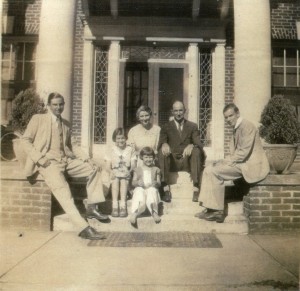 Reverend John McSween, a graduate of Davidson College and Columbia Theological Seminary, came to PC from Central Presbyterian Church in Anderson in 1928. Although the college was carrying a debt of $350,000, it had an excellent plant and a top quality academic reputation, so there was much optimism about the future. McSween, however, arrived just one year before the financial crash which began the Great Depression and his presidency would largely be taken up with economic issues.
Reverend John McSween, a graduate of Davidson College and Columbia Theological Seminary, came to PC from Central Presbyterian Church in Anderson in 1928. Although the college was carrying a debt of $350,000, it had an excellent plant and a top quality academic reputation, so there was much optimism about the future. McSween, however, arrived just one year before the financial crash which began the Great Depression and his presidency would largely be taken up with economic issues.
During Rev. McSween’s first year, the Synod of Georgia joined the SC Synod in control and support of the college. This move made necessary a new charter for the college and a change of name from the Presbyterian College of South Carolina to simply, Presbyterian College. This change encouraged more students from Georgia to enroll at PC, a rise from 16 in 1927 to 53 students by 1934. Overall, the student body increased approximately 30 percent during McSween’s tenure, despite the withdrawal of many students due to financial difficulty during the Great Depression (Hammet, Spirit of PC, 53).
 PC had formerly enrolled women students from the time of its founding in 1880 until 1921. Between 1921 and 1931, ladies were encouraged to enroll in Chicora College in order to strengthen that school. Chicora, like many other institutions, was failing and united with Queens College in order to survive. PC once again opened its doors to women, providing an opportunity for young ladies in the local vicinity. Approximately 26 women enrolled at PC during the fall of 1931 (Hammet, Spirit of PC, 57).
PC had formerly enrolled women students from the time of its founding in 1880 until 1921. Between 1921 and 1931, ladies were encouraged to enroll in Chicora College in order to strengthen that school. Chicora, like many other institutions, was failing and united with Queens College in order to survive. PC once again opened its doors to women, providing an opportunity for young ladies in the local vicinity. Approximately 26 women enrolled at PC during the fall of 1931 (Hammet, Spirit of PC, 57).
In January of McSween’s first year of service, a bachelor and major land-owner in the area gave a house to the college to be used as a home for presidents of the college. John Young had inherited from his brother, George Young, a beautiful colonial-style home (1916) located across Broad Street from the West Plaza. Young liked McSween and in his simple way of doing things, he sent one of his tenants to town on a mule to deliver a key and the deed for the home to President McSween. (Hammet, Spirit of PC, 55)
A five-week summer session was initiated in 1933, primarily for public school teachers in need of coursework, but also filling a need in the surrounding area. Synod youth conferences were staged on campus, as well. High school students could spend a week on campus, participating in religious instruction and recreational activities, while supervised and housed in college dormitories. These summer activities provided additional income for the operation of the college (Hammet, Spirit of PC, 63).
Rev. McSween brought the college through the Depression, managing to strengthen its ties with the church and to further improve its academic reputation. He resigned his presidency at PC in 1935 to become the pastor of the Purity Presbyterian Church in Chester. He had received many calls during his tenure at PC, but “stuck loyally to his mission here until he felt a change in leadership might prove beneficial” (Hammet, Spirit of PC, 65). Aside from a brief term as president of Tusculum College in Tennessee, he served in the ministry for the rest of his life. He died in Clinton on May 3, 1964.
Presbyterian College
503 South Broad Street